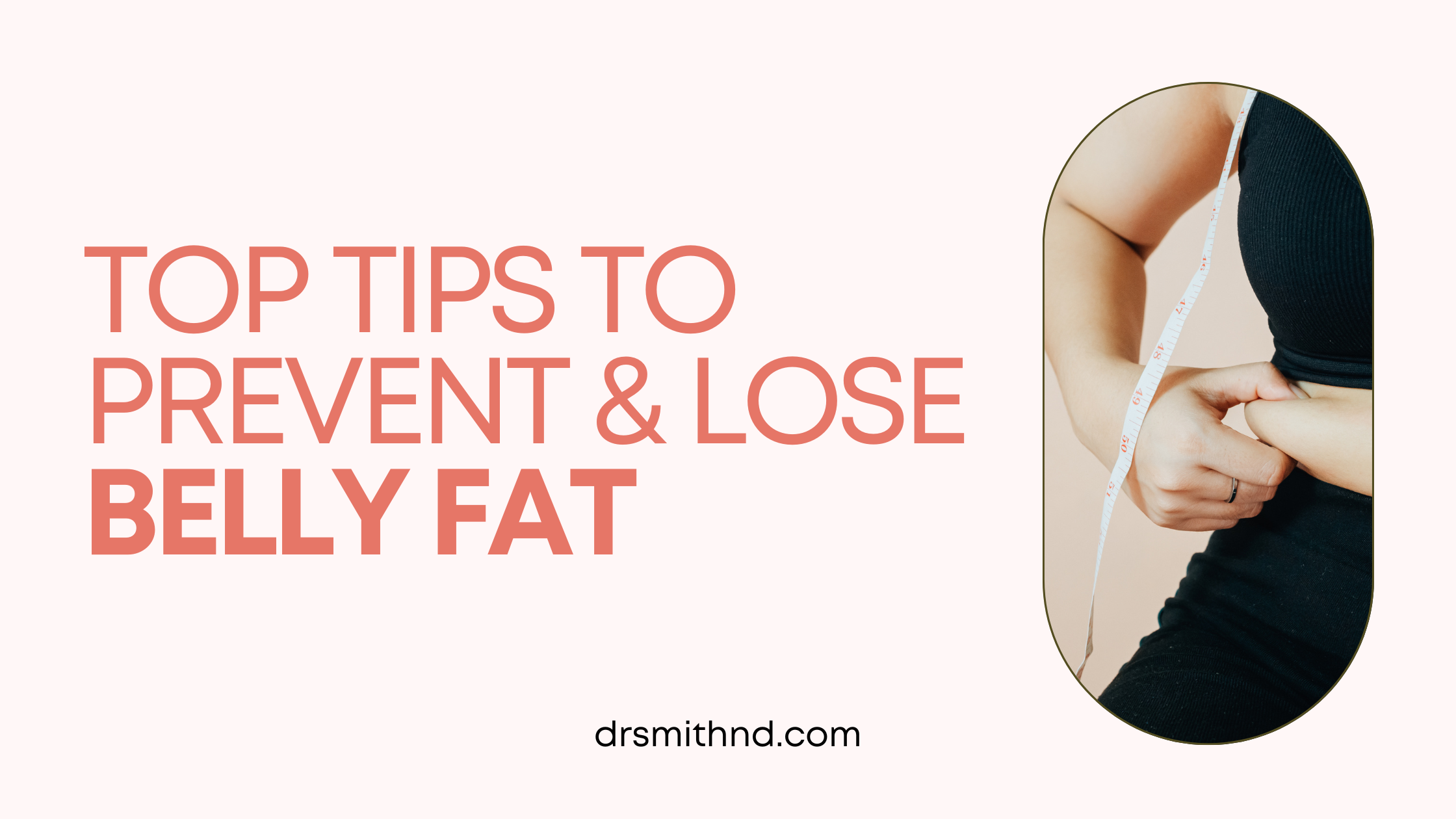With all the changes in our bodies during the menopause transition, there is one that raises so many questions, frustrations and self-doubt: BELLY FAT. Belly fat is the excessive tissue that often develops around the midsection at the onset of perimenopause (which begins 10 years before menopause, so as early as your late 30s.)
Why?!? Why Does This Happen?
As estrogen decreases during this transition, testosterone increases, and fat distribution begins to shift from the hips and thighs to the abdomen in the form of visceral, or “belly fat.”
It is important to know that belly fat isn’t just a huge annoyance; it’s also a risk. Studies show that increased visceral fat raises the risk of heart disease, diabetes, dementia, and breast cancer.
The Two Main Types Of Fat
- Subcutaneous fat, the fat underneath our skin, is found throughout the body, and often pinchable. It is usually more equally distributed, can be adapted through lifestyle modifications and in excess can lead to other health issues as well.
- Visceral fat, aka belly fat, is the adipose tissue internal to and surrounding vital organs including the liver, stomach, and intestines. To some degree we need visceral fat to support those organs, however too much can lead to insulin resistance, increased inflammation and heightened risk of metabolic syndromes, diabetes, hypertension, and cardiovascular disease. Women experiencing menopause and post-menopause often fight with this type of belly fat the most.
There is a close relationship between higher amounts of visceral fat, insulin resistance and inflammation.
For women in perimenopause, it’s crucial to have good information and a strategy to address your health. The good news is, visceral fat responds to lifestyle changes!
Top Tips To Prevent and/or Lose Visceral Fat
1. Exercise
As you transition into menopause, exercise will support good bone and joint health, produce endorphins, promote good sleep AND support good lean body mass to fat (visceral fat) mass ratios. You need a good balance of moderate cardiovascular exercise and strength training. It is important during this time to start to learn about and incorporate strength training if it is not yet in your routine.
2. Anti-Inflammatory Nutrition
A vibrant and strong diet full of complex carbohydrates, lean proteins, and healthy fats (nuts, seeds, avocados, olive/avocado oils, fatty fish etc.) will lower inflammation, support hormone production and improve your overall health. Cut down on sugars, consuming no more than 25 grams of added sugar per day. Increase your fibre intake to at least 25 grams or more per day. Eat more protein. Studies have shown that people who eat at least 1 – 1.5 g of protein for every kg of lean body mass have less belly fat than people who eat less. Try increasing your intake of high protein foods such as whole eggs, fish, legumes, nuts, meat, and dairy products.
3. Reduce Stress
Find new tools, skills, and support to help you with family, work, and your health. What might have worked in your 20-30s might not fully support the life transitions that come with menopause ages and stages. Find new ways to bring moments of joy, peace, and calm in your day. Small walks, fresh air, journaling, using a meditation app, yoga, breath work, or working with a therapist can really help.
4. Find a Community
Finding a group of women who are going through it and embracing the same approach during this time makes a huge difference. This could be online, friends, or a structured educational group (like my Peri Collective community for example: an online educational series where I provide you with all the tools you need to tackle your perimenopause years!). Learning from others on how they are supporting their bodies during all these changes and finding joy in common ground and goals is super helpful.
5. Improve Sleep
The best defence and tool to reduce belly fat is getting good sleep. For real! Look at your sleep patterns, quality of sleep, and overall sleep hygiene (room temperature must be cold, no screens, noise, comfort of clothing and bedding). Many women in perimenopause and beyond experience fluctuations in body temperature resulting in night sweats, making sleep almost impossible. Making nutritional and lifestyle changes, and consulting your healthcare provider to discuss other treatment options such as HRT during this transition can help with sleep. You cannot manage your weight during this time if you’re not sleeping.
6. Support Through Supplements
Yes, they do indeed have a role. Some great studies have emerged helping showing what can help us through perimenopause. The essential summary is that a good source of omega-3 fish oil, probiotics, and a fibre supplement can help a great deal. There are other supplements that I advise but on an individual basis, based on individual needs.
Studies show that people who consume more soluble fibre have a greater variety of bacteria and have less hormonal symptoms.
Individuals with a varied gut microbiome have a lower chance of belly fat. Probiotics are healthy bacteria found in food and supplements that support gut health, and we can improve our gut bacteria by eating more fibre. Foods rich in probiotics include yogurt, kefir, sauerkraut, kimchi, miso soup, soft cheeses, sourdough bread, acidophilus milk, and sour pickles (not made with vinegar – real, fermented pickles).
7. Try HRT
Yes it is a safe and important piece of the puzzle. You might be a great candidate for hormone replacement therapy (HRT). Educate yourself and work with your healthcare provider to identify your unique needs. We have come a long way in understanding estrogen and progesterone HRT. Do not be afraid to start this conversation and get the care that you need.
8. Quit Smoking
This one change can lead to significant changes in visceral fat loss and overall decreased risk of cardiovascular disease, stroke, and other metabolic disorders.
9. Consider Stopping or Reducing Alcohol
This absolutely will be an obstruction to both quality sleep which is where we started – and of course, alcohol is a sugar and our ability to keep our blood sugar both low and stable is not the same from perimenopause and beyond. Alcohol can make weight management very challenging even if we are doing the rest of it right. I strongly advise all my patients to drop it completely or get much more selective / reduce intake as much as they can.
10. Try a Customized Approach
For those at the end of their rope and in need of a more hands-on, custom approach, that’s okay! There is a time and place where we all need that. With clients seeking a specific plan, I use the invaluable Metabolic Balance™️ program which is absolutely effective, efficient and personalized.
And as always, don’t hesitate to reach out to our team at [email protected]
Warmly,
Dr. Kirsten 🦋



